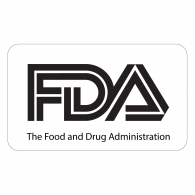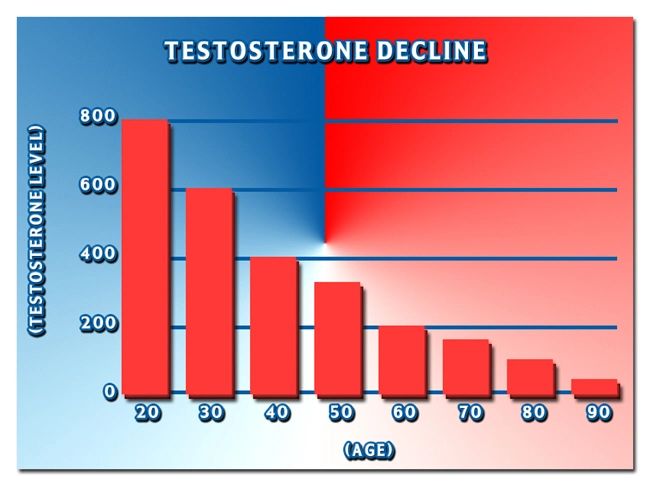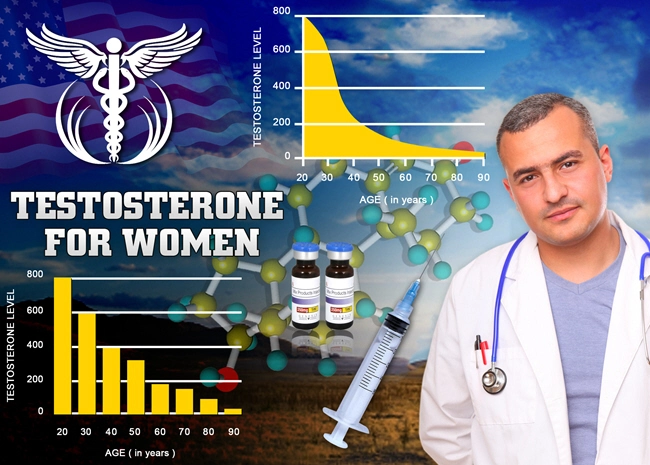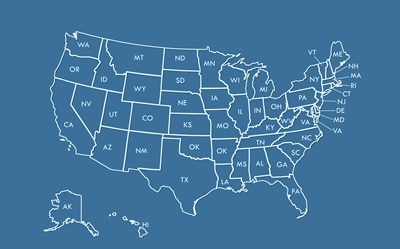
Video Link: https://vimeo.com/258990926
Video Download: Click Here To Download Video
Video Stream: Click Here To Stream Video
Undoubtedly, you've heard the warnings by law firms that always blare during radio and television commercials about the link between testosterone  replacement therapy (TRT) and cardiovascular disease.
replacement therapy (TRT) and cardiovascular disease.
An official-sounding voice informs you that:
“If you or a loved one used a prescription testosterone patch, cream, gel, deodorant or spray and suffered a heart attack, pulmonary embolism, blood clot, stroke or died, you might be entitled to monetary damages. Recent medical studies have concluded that men who used testosterone supplements were much more likely to suffer a heart attack, stroke, blood clot, or die than men who didn't take testosterone. Also, the FDA has issued an alert concerning these products. If you used prescription testosterone and suffered any of these problems, contact the law firm of...immediately at 1-800-380-5339 for a free, no-obligation consultation. Get what you deserve. We get results, and we'll make them pay.”
Sounds like money in the bank, right?
A slam-dunk, for sure. After all, these are the pros.
Why would they waste their time suing a colossal drug company if it weren't true?
Both the Food and Drug Administration (FDA) and teams of medical researchers are seemingly in agreement: testosterone can have some terrible side effects, especially concerning risk to your heart.
Not So Fast...What if These “Experts” are Wrong?
As with so many issues, there are two sides to the story.
A brand-new study of men who have undergone testosterone replacement therapy has found that taking supplemental testosterone does not increase their risk of suffering a major adverse cardiac event, such as a heart attack or stroke.
Researchers at the Intermountain Medical Center Heart Institute in Murray, Utah, which is the flagship facility for the Intermountain Healthcare system,  studied 5,695 men between the ages of 53 and 71.
studied 5,695 men between the ages of 53 and 71.
The men, all patients at Intermountain Healthcare hospitals, had initial low testosterone levels.
Primary outcomes included a composite of death, nonfatal heart attack, and stroke, and death alone.
They compared groups of persistent low testosterone, defined as less than 212 ng/dL, standard (between 212 and 742 ng/dL), and high >742 ng/dL. They concluded that:
- Men who received testosterone supplementation to restore their testosterone levels to normal had decreased overall rates of acute cardiac events at one and three years after their initial low levels of testosterone were measured, compared to other men who had persistently low levels of testosterone and did not undergo treatment.
- The lower rate of cardiac events included a reduction in the adjusted risk of death and a decrease in heart attacks.
- Overall 3-year rates for the composite outcome were 8.6% and for death alone 6.4%.
- At three years, those supplemented with average/high testosterone levels had a 45% reduced risk of the combination of death, nonfatal heart attack, and stroke and 57% decreased the risk of mortality alone compared to persistent low testosterone subjects.
- Results were similar after one year
- Men who take a supplemental version of the hormone are at no added risk of having a "major cardiac event" such as a heart attack or stroke, the team concluded.
The study could not come at a more convenient time since the FDA is currently evaluating the safety of testosterone supplementation to determine if it is a risk to the health of older men.
The research could help the FDA as it determines whether the male hormone treatment is safe.
 An FDA advisory committee voted in September to restrict indications for testosterone replacement therapy and required additional clinical trials to test the safety of the drugs, decisions that drew mixed reactions from urologists.
An FDA advisory committee voted in September to restrict indications for testosterone replacement therapy and required additional clinical trials to test the safety of the drugs, decisions that drew mixed reactions from urologists.
The advisory committee’s conclusions reinforce the need to conduct a thorough diagnosis based on serum testosterone levels and clinical symptoms and to follow patients in whom treatment is indicated, according to John J. Mulcahy, MD, Ph.D., a member of the Urology Times Editorial Council.
Abraham Morgentaler, MD, a urologist who made an oral presentation to the committee during a public hearing, called the vote “a step backward for our patients and science.”
The FDA’s original Drug Safety Communication about the cardiovascular safety of testosterone therapy was posted in January and was prompted by two published studies that evaluated the potential risk of stroke, heart attack, and death in men taking testosterone products.
Exploding Demand for TRT
The new findings that testosterone therapy is safe and does not increase the risk of major adverse cardiac events for men with low levels of testosterone assures physicians across the country to use it when it's needed with less concern about its effect on their patients' heart health, say, researchers.
This is especially important for physicians since the demand for testosterone replacement therapy has exploded.
According to the FDA, 1.3 million patients received a prescription for testosterone therapy in 2010.
By 2013, the number rose to 1.3 million patients, with men ages 40 to 64 making up 70% of the prescriptions.
ages 40 to 64 making up 70% of the prescriptions.
So far, the lack of federal approval hasn’t stopped doctors from prescribing testosterone to treat erectile dysfunction and other ailments.
Nationally, the FDA estimates about 1.3 million patients have undergone testosterone therapy.
"Testosterone therapy has become very popular in the United States in recent years," said Jeffrey Anderson, MD, a cardiologist at the Intermountain Medical Center Heart Institute, and lead researcher for the study.
"I hear it in Salt Lake, just driving to work: ‘Men, if you have low ‘T,’ come on in, we’ll fix you up. With this study, we are getting closer to defining the real associations between testosterone treatment and cardiovascular risks or benefits."
Smaller studies were conducted on testosterone replacement therapy and its cardiovascular effects in men, with different results.
While it is known that low levels of testosterone pose an increased cardiovascular risk, the risks versus benefits of supplementation have not been identified.
During clinical follow-up, men in the study were categorized as having persistently low testosterone levels (only 14% had been given supplements), normal levels, or high levels (all were enhanced).
All of the men had at least three years of subsequent follow-up observation.
Researchers then assessed the impact of death, heart attack, or stroke of supplementation to normal or high levels after one and three years by reviewing electronic medical records.
More Study is Needed
"While this study provides reassurance about the safety of using supplementation to move from low to normal levels of testosterone, more studies, particularly large randomized studies, are needed," said Dr. Anderson.
Because of a signal for increased myocardial infarction (MI, i.e., heart attack) and stroke, supplementation to high testosterone levels should be avoided, Dr. Anderson told Urology Times in an email.
“Large, randomized trials are now needed to clarify and confirm these findings,” he wrote.
 The study should allay concerns among doctors prescribing the treatment, Anderson said.
The study should allay concerns among doctors prescribing the treatment, Anderson said.
The Intermountain team’s observations show that it’s safe to build testosterone up to reasonable levels, as long as patients stop there.
"It seems like going to an average level, but not a super high level, would be the thing to do," he said by phone from Chicago, where researchers presented their findings to American Heart Association officers.
"It may even be preventative," Anderson said.
But that’s not definitive.
"We don’t think the data is robust enough to say it reduces your risk," he said.
The Intermountain team is seeking funding to study random samples of patients.
Such a project could help determine whether testosterone is linked to a reduced risk of a heart attack.
To learn more about the benefits of testosterone replacement therapy, contact our clinic for a free, no-obligation overview of our services.
References
New study finds testosterone replacement therapy does not increase heart risk
Study: No Link Between Testosterone, Heart Attack
Contact Us Today For A Free Consultation
Dear Patient,
Once you have completing the above contact form, for security purposes and confirmation, please confirm your information by calling us.
Please call now: 1-800-380-5339.
Welcoming You To Our Clinic, Professor Tom Henderson.

- LabCorp Announces a Change to the Testosterone Reference Range [Last Updated On: April 16th, 2025] [Originally Added On: June 23rd, 2019]
- Important Facts About Testosterone Therapy Before Buying [Last Updated On: April 18th, 2025] [Originally Added On: July 13th, 2019]
- Soy: Does it Lower Testosterone? [Last Updated On: October 18th, 2024] [Originally Added On: August 30th, 2020]
- Testosterone Treatments May Successfully Reverse Type-2 Diabetes in Some Men [Last Updated On: April 15th, 2025] [Originally Added On: November 13th, 2020]
- Testosterone Replacement Therapy (TRT) May Prevent Heart Attacks and Diabetes [Last Updated On: April 21st, 2025] [Originally Added On: November 17th, 2020]
- Did You Know? Recent Studies Have Confirmed the Link Between Low Testosterone (“Low-T”) and Depression. [Last Updated On: April 17th, 2025] [Originally Added On: January 10th, 2021]
- The Great Testosterone Debate [Last Updated On: April 20th, 2025] [Originally Added On: January 14th, 2021]
- Testosterone Replacement Therapy Lowers Heart Attack Risk [Last Updated On: April 19th, 2025] [Originally Added On: January 18th, 2021]
- New Study Says: The Benefits of Testosterone Replacement Therapy Outweigh The Risks [Last Updated On: April 22nd, 2025] [Originally Added On: January 19th, 2021]
- Male Menopause. Fact or Fiction ? [Last Updated On: April 23rd, 2025] [Originally Added On: January 20th, 2021]
- Testosterone: How Much Do You Really Know About This Masculine Hormone? [Last Updated On: October 6th, 2024] [Originally Added On: February 9th, 2021]
- Low-T: What are healthy levels of Testosterone and why is it difficult to measure? [Last Updated On: September 11th, 2025] [Originally Added On: April 3rd, 2021]
- Testosterone Therapy May Be Good for the Heart if You Have Low-T [Last Updated On: May 3rd, 2025] [Originally Added On: July 21st, 2021]
- A Recent Study Concludes: Testosterone DOES NOT Cause Prostate Cancer [Last Updated On: September 14th, 2025] [Originally Added On: August 16th, 2021]
- In the Battle Against Aging, When do the Risks Outweigh the Rewards? [Last Updated On: April 4th, 2025] [Originally Added On: August 18th, 2021]
- New Study Concludes: Boosting Testosterone Levels Lowers Men's Death Risk [Last Updated On: May 11th, 2025] [Originally Added On: August 20th, 2021]
- Testosterone Replacement Therapy Slows Prostate Cancer! [Last Updated On: April 2nd, 2025] [Originally Added On: September 13th, 2021]
- Research proves that Testosterone Therapy Boosts Fertility! [Last Updated On: April 5th, 2025] [Originally Added On: September 26th, 2021]
- Free Testosterone and Sex Hormone-Binding Globulin [Last Updated On: April 6th, 2025] [Originally Added On: October 15th, 2021]
- Testosterone Does Not Cause Heart Attacks [Last Updated On: April 7th, 2025] [Originally Added On: October 15th, 2021]
- Testosterone and Women [Last Updated On: April 8th, 2025] [Originally Added On: October 15th, 2021]
- Testosterone and Metabolic Syndrome [Last Updated On: April 3rd, 2025] [Originally Added On: October 15th, 2021]
- Testosterone and Disease Prevention [Last Updated On: March 31st, 2025] [Originally Added On: October 15th, 2021]
- Judge Vacates $140 Million Verdict in Testosterone Lawsuit [Last Updated On: April 1st, 2025] [Originally Added On: October 15th, 2021]
- Testosterone and Estrogen [Last Updated On: April 9th, 2025] [Originally Added On: October 16th, 2021]
- Testosterone and Aging [Last Updated On: April 10th, 2025] [Originally Added On: October 16th, 2021]
- Testosterone Replacement Therapy (TRT) Benefits [Last Updated On: April 11th, 2025] [Originally Added On: October 16th, 2021]
- Testosterone and Male Menopause [Last Updated On: March 30th, 2025] [Originally Added On: October 16th, 2021]
- Testosterone Battles Obesity [Last Updated On: March 29th, 2025] [Originally Added On: October 16th, 2021]
- Why You Need Testosterone Replacement Therapy [Last Updated On: May 14th, 2025] [Originally Added On: October 16th, 2021]
- Testosterone FAQ's [Last Updated On: May 13th, 2025] [Originally Added On: October 25th, 2021]
- How Testosterone Impacts Sexual Preferences In Men and Women [Last Updated On: March 28th, 2025] [Originally Added On: October 30th, 2021]
- Growth Hormone and The Thyroid Gland [Last Updated On: April 24th, 2025] [Originally Added On: November 19th, 2021]
- How Does Masturbation Affect Testosterone Levels? Exploring the Science [Last Updated On: May 24th, 2025] [Originally Added On: March 27th, 2022]
- Testosterone Therapy Increasingly Used to Help Men Take Control of Aging [Last Updated On: May 25th, 2025] [Originally Added On: May 30th, 2022]
- The many benefits of Testosterone Replacement Therapy (TRT) [Last Updated On: November 1st, 2025] [Originally Added On: June 13th, 2022]
- Tlando Testosterone - A Brand New Way to Treat Low-T Safely with a Testosterone Pill [Last Updated On: May 28th, 2025] [Originally Added On: July 12th, 2022]
- Safe Tlando Testosterone Changes Landscape of Low-T Therapy [Last Updated On: May 30th, 2025] [Originally Added On: August 15th, 2022]
- Systems to Monitor Testosterone Replacement Therapy (TRT) [Last Updated On: October 12th, 2025] [Originally Added On: September 21st, 2022]
- Testosterone May Help You Keep Your Job (Or Find Another) [Last Updated On: June 12th, 2025] [Originally Added On: October 4th, 2022]
- Toxic Chemicals are Killing your testosterone…And your Manhood! [Last Updated On: October 28th, 2024] [Originally Added On: October 10th, 2022]
- A new study reveals that Testosterone improves body composition in men with low testosterone! [Last Updated On: October 22nd, 2025] [Originally Added On: October 17th, 2022]
- A former Mr. Olympia speaks about testosterone [Last Updated On: October 10th, 2025] [Originally Added On: November 8th, 2022]
- Testosterone Blockers Thwart Melanoma [Last Updated On: June 9th, 2025] [Originally Added On: December 11th, 2022]








